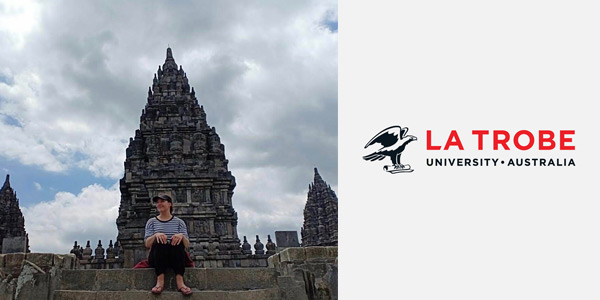Mariann (Mari) Turner is a New Colombo Plan mobility grant recipient from La Trobe University. Mari undertook the Agriculture Semester Program at Bogor Agricultural University in Semester 2, 2018.
Q: Why did you decide to undertake ACICIS’ Agriculture Semester Program (ASP)?
I wanted to challenge myself. The semester at IPB university was my last before graduation and I wanted to build my resilience and skill-set before commencing work. I also decided to trial the plausibility of working overseas long-term and whether this was something I would pursue in the future.
Q: What classes/units are you currently enrolled in?
- Tropical Biodiversity: Lecture and discussion style learning based around past, present and future challenges regarding the biodiversity of Indonesia.
- Pest and Disease of Food and Horticultural Crops: Each week we were introduced to 10-15 specimens which we documented and memorised. This subject also included field trips and problem-solving for farmers in the region regarding their crop pests and diseases. Despite the workload, I really enjoyed this subject.
- Basic Food Biochemistry: Lecture delivered material on basic biochemistry e.g. proteins, DNA etc. The second half of this subject focuses on the food systems, food as nutrition and post-harvesting of plants and meat products.
- Integrated Pest and Disease Management: Lectures and fieldwork encouraging a multifactorial agricultural approach that aims to reduce the reliance on chemicals and encourages understanding of biological systems.
Q: How has your study in Indonesia influenced your understanding of Agriculture or Food Security in the region?
A large proportion of the food grown in the area is sold locally, even within the chain supermarkets. Having access to local produce was great, however, I was surprised by the ‘goreng-goreng’ everything (fried food) and the huge quantities of palm oil used. The nutritional impact and environmental consequences of food choices tended to be poor, either by choice or necessity. Agriculture continues to be important in this region, but alterations to practice or knowledge tend to be slow and not prioritised. I would expect the increased pressures of climate change, especially in relation to pests and diseases, to have a large impact on future food security within this region.
Q: What d0 you like to do in your spare time in Bogor?
- Culinary adventures – once you get over your first food poisoning experience and acclimatise, you are good to go – try everything and anything!
- Swimming
- Yoga
- Exploring – Bogor and other places
- Going to the movies (so cheap!)
- Hanging out with friends
- Shopping
Q: Are you undertaking an internship while in Indonesia?
Yes. My internship involves working with CIFOR- Centre of International Forestry Research. During this placement, I assist on a wildlife diversity research project in Papua. I assist in cleaning and analysing data,as well as researching and reporting on biodiversity within Papua.
Q: What is your favourite Indonesian food? Where is your favourite place to eat?
Avocado Juice or gado-gado on campus for $1!
There is a little juice stall on the side-street towards university, just off the left of Jalan Bara. Juice for 50c! Try sirsak, mangga, alpukat or whatever takes your fancy.
Q: What is your favourite Indonesian word or phrase?
Nggak/engga/gak = informal for “no”. It’s pretty satisfying if you get the pronunciation right.
Q: What places in Indonesia have you visited during your semester so far?
Bandung, Jakarta, Yogyakarta, Puncak & Thousand Islands.
Q: How did you find IPB?
IPB is a beautiful and spacious campus. I really enjoyed the student culture, where students work incredibly hard and celebrate their journey together through events and eating together often. The university also places great importance on research and practical application of knowledge and skills, and in doing so positions itself as relevant on both a local and international platform.


